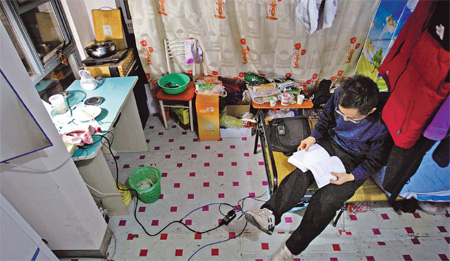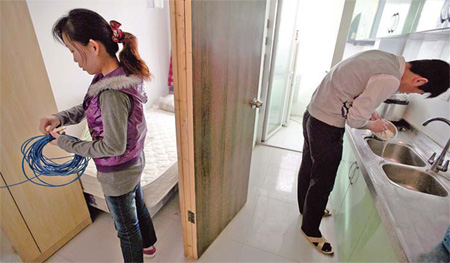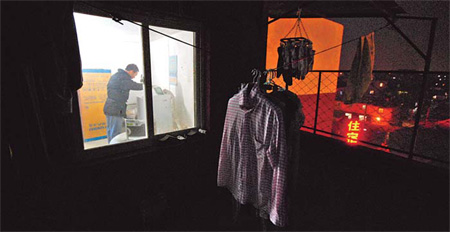Focus
City 'ants' face eviction from colonies
By Wang Yan (China Daily)
Updated: 2011-01-10 08:02
 |
Large Medium Small |
|
|
|
|
|
|
Policy targets cramped conditions of capsule living. Wang Yan in Beijing reports.
Wang Tao lives in a 7-square-meter cubicle erected in a cramped three-bedroom apartment in north Beijing. He has 11 roommates.
"All of the tenants are young people. Some are unmarried couples and some, like me, are single," said the 27-year-old, who works in security at a State-owned company in Beijing. (He did not want his real name used for fear of upsetting his employers.)
Capsule apartments have grown extremely popular among the "ant tribe", the Chinese term for low-paid college graduates huddled together in cut-price city housing. Wang, who earns just 1,500 yuan ($220) a month, pays 650 yuan for a space in the capital's massive Tiantongyuan residential complex. For him and thousands of others, it is "the only affordable option".
Yet, come Feb 1, the practice of dividing rooms to house multiple tenants will be banned nationwide.
The regulation, which was unveiled by central authorities last month, has sparked intense debate, with some fearing the move could force low-paid white-collar workers out of cities and lead to a possible labor shortage.
Tenants and landlords are staying relaxed, however. Many of those who talked to China Daily said the ban is unlikely to make an impact on the huge demand. Policy and real estate experts agreed.
"No one would crush into a small room if they earned a decent living," said Wang. "If nobody can provide a legal place (that is affordable), I'll have to keep looking for something like I have right now."
Finding cubicles is not hard in any city. A simple Internet search produces a list of apartments with spaces to rent for less than 1,000 yuan a month.
Wang, who arrived in Beijing in 2006 after graduating Tianjin University of Science and Technology, has lived in three different units, with prices ranging from 600 to 850 yuan. He said that, like most landlords, his is a sub-lessor who runs several converted apartments.
"(The landlord) is making money," he added. "He doesn't care about being caught."
Huang Rixin, one of the pioneers of capsule homes in Beijing, said low-cost housing was vital for graduates and white-collar workers who flock to cities.
"Young people need a place to stay before they can realize their big-city dreams, while cities definitely cannot keep developing without the migrant population," said the 79-year-old engineer, who recently donated his capsule apartments to the capital's Shijingshan district government.
Living in a box
Under the rules issued by the Ministry of Housing and Urban-Rural Development in December, houses and apartments must be rented based on their original designs, while the use of kitchens, bathrooms and balcony areas as bedrooms is banned. Offenders will face fines from 5,000 to 30,000 yuan.
"The regulation replaces an earlier version in the 1990s. The old one no longer fits the fast developing housing rental market in China," said Li Chang'an, a public policy professor at the University of International Business and Economics (UIBE). "However, the new one looks too advanced."
For a start, the number of low-cost public rental apartments is already insufficient to meet the demand. "Beijing alone had only about 20,000 apartments in 2010, while there were millions of potential renters looking for places," he added.
A report on the 2010 housing rental market in Beijing by the 5i5j property agency found the demand for group rentals had risen as a result of rising rental costs.
"For those who pay less than 1,000 yuan a month, the average rent is 814 yuan for an average area of 15.41 square meters. The major house types are two-bedroom and three-bedroom apartments, with each containing four to eight tenants," read the report.
Its authors added that, over the next two years, demand in Beijing will further increase due to the city's plan to renovate underground areas, including the disused air-raid shelters that house the so-called "mouse tribe".
"Although the Beijing government has initiated a number of public rental housing projects, factors including hukou and rental prices will prevent the (projects) from fully functioning for many low-income people," the report concluded. "The group is likely to keep living in Beijing's outskirts or depending on group rentals."
The latest policy also demands that the amount of living space per capita does not fall below the required standard set by local authorities. For example, in Beijing rooms should be at least 4 square meters in a bungalow and at least 10 square meters in a multi-story building.
Meeting the targets will be hard, said Lian Si, assistant professor at UIBE's school of public administration and author of the book, Ant Tribe.
A six-month survey by Lian's team last year found 59.6 percent of "ants" live in rooms smaller than 10 square meters and 20.4 percent in rooms smaller than 5 square meters. The poll included 4,807 residents in Beijing, Shanghai, Guangzhou, Wuhan, Xi'an, Chongqing and Nanjing, cities with high concentrations of "ants".
"The percentage of people living in areas smaller than 10 square meters has decreased from that of our 2009 survey, which was 69.6 percent," said Lian. "That's mainly because living areas are larger in cities other than Beijing. The figure for 2009 was only for Beijing."
He estimates the ant tribe population passed the 1-million mark nationwide in 2010. "The key is how effectively the new regulation is carried out, especially at the ground level. Based on past experiences, local governments lack the implementation capacities," added Lian.
Making it happen
The difficulties authorities face in enforcing the ban is also a concern for those in the property industry.
"The regulation is basically saying every person should live in an individual room, which goes against the current market trend," said Chen Baocun, assistant secretary-general of the National Real Estate Managers' Alliance.
He said he feels the rules will be virtually impossible to implement as long as there is huge demand for capsule apartments. Administrations will have to invest time and manpower to prevent illegal conversions and group rentals, he said. "Once there is a loophole, the fish will escape the net."
Li at the UIBE agreed and added: "There are 2.4 million apartments for rent in the capital alone. Checking door to door would be a massive job."
In fact, eight districts of Beijing have prohibited room conversions to create cubicles since in September 2009.
A real estate agent in Beijing who did not want to be identified explained that large companies like the one he works for have gradually stopped building capsule units since the 2009 regulation, "although I can find you one if you are really in need".
Xu Ying said she has experienced the slow implementation of anti-conversion regulations firsthand. Her family used to live in a rented apartment in Beijing's Haidian district but was forced to move after the owner of the property above carried out conversion work.
"In 2008, my neighbor upstairs built 12 partitions in their 160-square-meter apartment and leased the place to about 20 people," said the professor of journalism at Renmin University of China.
"Because of the large number of residents, the front doors of the residential block and the apartment were always open. Outsiders were free to enter the building," she said.
Worse was to come. In April 2009, a sewage line to the property above broke and spilled into Xu's home.
Although she is no longer living in the block, Xu is suing her neighbor for 117,000 yuan in compensation and is demanding the number of renters is reduced. The case is still awaiting an outcome and Xu said she has grown impatient with administrative departments passing the buck.
"I've complained to several offices, including the mayor's, but all I've got back are excuses that it's another department's responsibility," she said. "If the government keeps doing nothing, this new rule will be nothing more than wastepaper."
According to the details of the regulation, the move is aimed at protecting tenants' rights and safety. Landlords will be barred from issuing rent hikes and could be liable in the event of an accident or fire.
An information official at the Ministry of Housing and Urban-Rural Development declined to comment when contacted by China Daily. However, in an interview with Xinhua News Agency, Jiang Wanrong, deputy director of the ministry's real estate market supervision, said conversions of houses and apartments affected the structures and posed potential dangers. In addition, tenants' rights cannot be guaranteed under such circumstances, which could prove a drain on public resources if it leads to a spike in disputes, he said.
"Renting a house or apartment and sharing with others is allowed," he added. "Dividing rooms into several units to rent to groups of people is not."
Li Yao contributed to this story.



